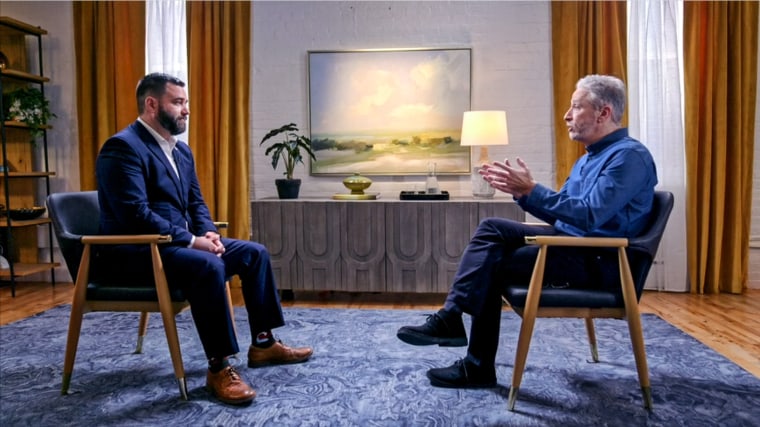The superviral episode of “The Problem With Jon Stewart” on Friday could’ve been called “The Glass Onion: The Problem With Crime.” Yet, for all the hypocrisies Stewart revealed in his skillful peeling back of the onion’s layers, his exposure of conservatives’ hypocrisy about the cherished American value of freedom clearly struck a nerve.
Stewart lasered in on the hypocrisy of “our loudest tough-on-crime advocates … trying to solve the problem with the problem.” And, on social media, millions of people reveled in his complete dismantling of Republican Oklahoma state Sen. Nathan Dahm’s illogical arguments about guns. Dahm is a Second Amendment poster boy: He has proposed a number of bills in the Oklahoma Senate to further relax gun restrictions and even authored the first anti-red-flag law in the country — red flag laws, remember, are intended to keep guns out of the hands of people deemed to be threats to themselves or others.
Sitting across from the former “Daily Show” host, Dahm rehashed the same tired arguments, including the rage-inducing claim that gun-related deaths are attributable to “fatherlessness” and “broken homes.” (This is classic misogynistic and racist language used against women who take care of themselves and their families.)
Dahm, like many conservatives, also leaned on the language of “protection.” They deploy it in pro-gun arguments, as well as in many other instances when they want to stoke public fear and rage — from their nonsense claims about wanting to “protect girls sports” by banning trans kids from participating on girls school teams to “protecting children” by banning books that recognize the existence of LGBTQ and Black people and their histories. Stewart made it a point to nail Dahm on the hypocrisy of drag show bans — which, in Dahm’s logic, are necessary to “protect children” — by emphasizing that the leading cause of child deaths isn’t drag queens. It’s guns.
Stewart made it a point to nail Dahm on the hypocrisy of drag show bans.
“What you’re telling me is you don’t mind infringing free speech to protect children from this amorphous thing that you think of,” Stewart said, “but when it comes to children that have died, you don’t give a flying f--- to stop that because that shall not be infringed.”
"That's your opinion," Dahm replied, before claiming his argument wasn't wildly hypocritical because "the First Amendment is treated differently than the Second Amendment."
It’s easy for people like Dahm to speak on behalf of children, because children have very little agency and power — that’s the point. (Even though an overwhelming number of school-age children who are interviewed and polled express fear and anxiety about school shootings.) Children are red herrings. The real people Dahm is protecting are the people in power, his fellow legislators and, more broadly, the white supremacist patriarchal status quo.
But I think the most significant insight of the interview and the episode in general is about what freedom means in America. Or, rather, how conservatives like Dahm define American freedom — a definition that isn’t really freedom at all.
Let’s revisit Dahm’s predictable argument: that more guns equals more safety, because, armed with guns, people can protect themselves. Putting aside the illogical self-defense argument — because guns are weapons, not shields, and can’t block bullets from entering your body — the statistical opposite is true. Various data indicate an unquestionable correlation between more guns and more gun-related homicides and suicides. Stewart pressed Dahm about his factually incorrect argument: “We’ve got 400 million guns in the country. We had an increase, and gun deaths went up. So when, exactly, does this curve hit that takes it down? Would a billion guns do it?”
"Let's run those numbers," Dahm responds, before arguing that the actual problem is "the individual." But Stewart's final point is striking, because he has homed in on the absurdity of the statistical fact that there are more guns than people in America — and that, arguably, guns have more rights and protections than most of us, especially in the aftermath of the Supreme Court's Dobbs decision, which struck down Roe v. Wade. I mean, what does it say that it’s easier for guns to cross state lines than pregnant people? What does freedom mean?
“2022 is on pace to see the third-highest number of firearms sold since that number was tracked,” Rep. Lauren Boebert, R-Colo., tweeted in October. “Let freedom ring!”
But freedom doesn’t ring — it’s a gunshot. If American freedom is symbolized by a gun, then, stripped of its parts, American freedom is nothing less than gluttonous consumer capitalism centered on a deadly weapon. This freedom, according to men like Dahm, can’t be regulated in any way. This is also why Dahm harps on the Second Amendment clause stating that the right to keep and bear arms “shall not be infringed.” He even considers gun registration to be an infringement, even though Stewart explains that “inconvenience is not the same as infringement” and that registration is required before people can vote — you know, the right that is actually essential to a functional democracy.
But if the Second Amendment has been construed to signify American freedom, then what about the rest of the Constitution? What about the Ninth Amendment, which states, “The enumeration in the Constitution, of certain rights, shall not be construed to deny or disparage others retained by the people”? That is, we have fundamental rights — about the freedom to control our own bodies, the freedom to move and the freedom to privacy — that are threatened by the egregious legal and political interpretations of the Second Amendment.
Freedom isn’t the terrorization of the collective mind and body of the American public. We shouldn’t have to live our lives fearing our daily errands and activities — going to school, going to the supermarket, going to the dance studio — pose mortal risks.
And this is the hypocrisy that Stewart shows us: American freedom is anything but freedom.
